HIT CHANNEL EXCLUSIVE INTERVIEW: September 2020. We had the tremendous honour to talk with a legendary musician: Rick Wakeman. There is no doubt that he is one of the greatest keyboard players of all time. As a member of Yes in the ‘70s, he recorded monumental progressive rock albums such as “Fragile”, “Close to the Edge” and “Going for the One”. He has also recorded with the Strawbs, David Bowie, Elton John, Cat Stevens, Black Sabbath and Ozzy Osbourne. Since 1973, he has embarked on a very successful solo career. His latest solo album,“The Red Planet”, is a comeback to his progressive rock past. Read below the very interesting things he told us:
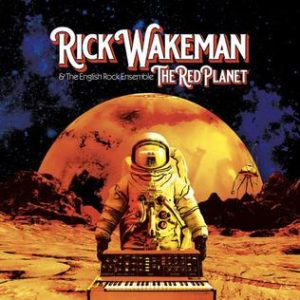 Are you satisfied with the response you got so far from fans and press for “The Red Planet” album?
Are you satisfied with the response you got so far from fans and press for “The Red Planet” album?
I will be very honest with you: It’s better than I could ever have expected. The response has been just tremendous. I ‘ve been honestly extremely pleased because we worked very hard on the album. I generally believe that it’s the best thing that I’ve done for an awfully long time. One of the hardest things for any musician or writer is that can’t hear your music for the first time. Because you are working on it for months and months, so when it’s finished you watch it grow. It’s a bit like -I suppose- if you have a nephew or a grandchild: You see them when they were a baby; if you don’t see them for a few years and then you suddenly see them, they have just grown enormously. They have changed so much. I think it’s a right comparison. You haven’t seen them grow, you haven’t seen them change. So, it’s a bit like that with music. Every day I worked on “The Red Planet” and every day it was growing a little bit more, so you never actually see the finished thing for the first time. I ‘ve been absolutely thrilled on the wonderful response it had. With all this pandemic and horrible things going on, it still made my year.
How spontaneous was your decision to make a progressive rock album with the English Rock Ensemble after 17 years?
(Laughs) It’s a long time, you are right. That is down very much to the fans of the music, because all the time I’ve been on tour both with Jon Anderson and Trevor Rabin (ARW) and also doing my piano tour, everywhere in America and Europe I’ve been, after every show or before a show, people would say to me: “When are you going to do another progressive rock album and an instrumental one like you did with ‘The Six Wives’”? (1973) And I always gave the same answer: “I would like to, but I need a good concept to inspire me, because I can’t just write a piece of music and then give it a name”. I have to have visions of what is all about, so I need a great concept and I said: “I haven’t found a good concept that really inspires me. When I do, I’ll do the album”. Then, a couple of years ago, a very good friend of mine, Garik Israelian, who is a scientist, an astrophysicist, he is the man who discovered and proved black holes and I was introduced to him and also professor Stephen Hawking by my great friend, Brian May (Queen -guitars), who is also an astrophysicist. They run a festival called Starmus and Starmus is amazing. At the end of all the lectures and the weaker things that go on, they always have a concert and I’ve done it with my band, I’ve done it with Brian May… In fact, last year (ed: 2019) which was the 50th anniversary of man landing on the Moon, we did it in Zurich, we had a huge orchestra and choir and I did it with Hans Zimmer, Steve Vai and Brian May and it was amazing. And at the end, we had every surviving astronaut who walked on the Moon walk on the stage. It was just incredible.
Before that, when we were putting it together, Garik said to me: “You know, 2021 is another big year?” and I said: “Why is that?” He said: “It will be the 50th anniversary of a craft first reaching Mars”. I said: “Oh, really?” He said: “Oh, yeah. In recent years, as technology has grown, we have over 50 missions there and the photographs and the data coming back is incredible”. He said: “Some of the photographs, if you look, are so crystal clear you could actually be there. I will send you something”. He sent me some, there are a lot on line and I have some from my friends in NASA. I just found it absolutely fantastic and then I discovered that a couple of billion years ago, it wasn’t a red planet, it was a blue planet. It had oceans and rivers just like Earth has and I found that absolutely inspiring and fascinating. I think that the thing that really mattered for me was when I read that there are rains on Mars, but not rain as we know rain, it rains the equivalent of dry ice. I thought: “Dry ice? How rock ‘n’ roll is that for the ‘70s”. I just got so engrossed with the subject that I read so much about it and I found the different areas that I found inspiring to write music for. And that was it. Everything occupied my mind for a long time while I was writing the music.
Why did you choose “Ascraeus Mons” as the first digital single from “The Red Planet” album?
I will be very honest, that was the idea of the distributor, of the record company. They said they would like to do it and I said: “Absolutely fine! If you would like to do that, then that’s absolutely fine”. I didn’t even know that they were initially going to release something as a single track, but it’s absolutely fine. I mean, they are very supportive of everything and if they think it’s a good idea, then that’s fine by me.
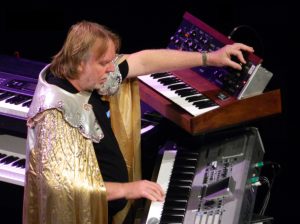 I like the calm part on “Arsia Mons”, the guitar in particular. Would you like to tell us a few words about this song?
I like the calm part on “Arsia Mons”, the guitar in particular. Would you like to tell us a few words about this song?
One of the great things among the journey is mountain, (ed: “Mons” in Latin) in translation, and they are all volcanoes. In Mars is full of volcanoes. A lot of the mountains are four or five times the size of anything on Earth, but there are also all around the areas. There are wonderful, calm places as well. When I looked at all the pictures in a sort of journey around certain areas on Mars, I found out that there were some different kinds of moods. I looked at different areas and that gave me different moods. In “Arsia Mons” I just have wanted a relaxing mood, I wanted a powerful mood, I wanted moods that make you want to travel. It’s very interesting how all the different pictures of the areas that I looked at, made me write different little bits that I then all put together to make a piece.
What’s the secret behind the great chemistry that you have on “The Red Planet” with the English Rock Ensemble members?
Going back to 1971, I was working with David Bowie on “Hunky Dory”. We were talking about musicians and he showed me on the guitar “Life on Mars?” funnily enough and then said: “Play it to me like a piano piece”. I said to him: “How do you want me to play it?” and he said: “You know how I want you to play it”. I said: “I don’t, that’s why I’m asking you”. He said: “You do know how I want you to play it. So, play it”. “Ok”, so I just played it and he said: “That’s exactly how I want you to play”. He said: “Listen, when you make your records whenever possible, always pick musicians that you are sure they understand what you are trying to achieve. If you do that, you will achieve it. You can have the best musicians in the world, if they don’t understand what you are trying to do musically, you won’t get the result you want”. So, I picked Lee Pomeroy (bass) because I knew he would instantly understand what I was trying to do. The same with Dave Colquhoun (guitar). Ash Soan is a drummer that I used once before when I played in Cuba and I knew from his technique and the style how he thought, that he would understand absolutely what I was trying to do. So, that’s why I picked those three and there is no doubt I was right, because not only did they do what I was trying to achieve, but they gave me a lot more, as well.
I know that you have booked solo shows for Christmas, but are there any touring plans for “The Red Planet” album?
Yes, there are. I ‘ll be very honest with you: I am not sure whether or not the Christmas shows will all happen, because we ‘ve just gone into another small lockdown here in the UK, but I think that it is likely to carry on and I think that the theatres will cancel anything that they have. So, I’m not sure about that. At the moment, they are still on but -I’ll be honest- I have my doubts. But it will be down to the theatres to decide what they want to do. Next year, yes, we are going to do some “Red Planet” shows. That is absolutely for sure. I think that they would have to be certainly April onwards because there is no way that we would be able to do the concerts before that, with the pandemic problems around the world. Absolutely, everybody wants to do “The Red Planet” live and we will do the whole thing in Armenia in September at the Starmus Festival.
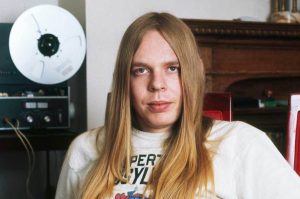 How challenging was it for you to cover “Stairway to Heaven” on your “Piano Portraits” album (2017)?
How challenging was it for you to cover “Stairway to Heaven” on your “Piano Portraits” album (2017)?
Ha, it was quite challenging, in a strange way, because the original is so fantastic. It’s just an amazing song in every way. I wondered if it would work without the vocals. I thought a lot about it and then I discussed it with my co-producer and engineer, Erik Jordan, but he said and he’s absolutely right: “The song is so well-known, everybody knows most of the words. So, they will be hearing the words in their head while you are playing it. So, it’s absolutely fine to do it as an instrumental because the tune is strong and people know the words anyway”. So, I felt comfortable with that and I was very pleased with how it finished.
Did you enjoy playing live with Brian May (Queen) at Starmus Festival in 2014? I loved his playing on “Starship Trooper”.
Yeah, Brian is a very close friend of mine. He was brilliant, as he always is. I have so much admiration for Brian May. I said to him to come and play with my band and he loved it. To be honest, I know for a fact that he absolutely loved it playing with my band. They are great musicians. His wife, Anita, said to me afterwards: “I wish he do more” (laughs).
Are you proud that “The Six Wives of Henry VIII” (1973) is considered a classic album?
I mean, it’s very interesting because when “The Six Wives of Henry VIII” was first released, it didn’t have a great response because record companies and the media didn’t understand an instrumental album: Why are you doing an instrumental album? Why is it that long? Where are the vocals? Why aren’t there any songs? But it was one of those things. Again, the fans thought it was incredibly well and it was the fans that sort of said: “No, we like this. This is a bit different”. I have always tried to do things a bit different and not trying to follow the crowd. Again, David Bowie always said: “Listen to what it’s in your head and heart. Not what is in somebody else’s head and heart”.
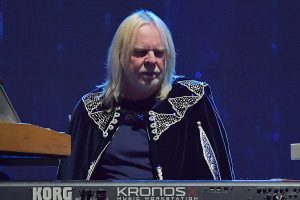 Is the “Journey to the Centre of the Earth” concert at the Royal Festival Hall in 1974 the biggest gamble you ever took in your career? You recorded it live with a pub band!
Is the “Journey to the Centre of the Earth” concert at the Royal Festival Hall in 1974 the biggest gamble you ever took in your career? You recorded it live with a pub band!
The band, they were a bit better than that. They were basically the band that became more awesome than they played before. They were good musicians, they were good players. The big gamble was the cost because the record company had not given me enough money to do the recording and to do the concerts. So, I took out a huge loan against my house and against everything that I had. In fact, had it failed, I would for sure have gone bankrupt.
How emotional was it for you to play “Life on Mars?” on BBC Radio 2 on the day of David Bowie’s death?
It wasn’t hard for the simple reason that it wasn’t planned. My great friend, Simon Mayo, whose programme it was, I went on and talked about David. There was no mention of any playing. Then, literally 10 minutes before his radio show finished, he said to me off air, he had to offer an idea: “Why don’t you play ‘Life on Mars?’ live to finish the show?” I said: “Oooh!” and he said: “Go to the studio next door, the piano is there”. So, by the time I got in and sat down and I didn’t have time to think about it. I think if I would have had a day to think about it, if they would have said: “Oh, would you play it live?” I think I would have been very-very worried that it wouldn’t go well. David was such a good friend that it would have been a disaster and not a tribute. But because I didn’t know, when I played it was just instant. I look at pictures when I close my eyes while I play most of the time, and I closed my eyes a lot and I went back and remembered the time when David first played it to me on his guitar. So, in many ways he was with me when I played it. But it was very emotional, I have to say.
Do you have any memories of the “Space Oddity” (1969) recording sessions with David Bowie?
Yeah, I remember them well because I was asked to come and play the mellotron, which is a strange instrument and very difficult to keep in tune and I had a sort of a reputation of being able to keep in tune and get the best out of it. So, I was called up to do that. In fact, it was after that session that David said to me: “I heard some of your organ playing. Would you like to come and do some piano for me?” So, “Space Oddity” really started off my association with him.
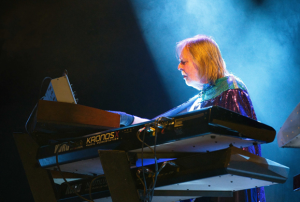 What’s your opinion about “Tales from Topographic Oceans” (1973) today?
What’s your opinion about “Tales from Topographic Oceans” (1973) today?
I have the same opinion, it doesn’t change. I mean, there are a lot of very good playing pieces on it, there are very good melodies and tunes, but there is a lot on that, that I don’t think it’s very good. The reason is because when we wrote the pieces initially, I think one was 14 minutes, one was 8, one was 17 and that’s too much for one album, but on the other hand, it wasn’t enough for a double album. So, it was either edit them down and make a single album or extend them to make a double album. We needed about another 13 minutes worth of music, and we didn’t have it. A lot of it was made up in the studio and I didn’t like that. YES was always best when they thought about the music putting together. So, for me there was a lot of padding that didn’t work. The truth of the matter is -and I spoke to Chris (ed: Squire -bass) and Jon (ed: Anderson -vocals) about that and they both agreed years later- that if the CD had been available then, there wouldn’t be a problem. Because we could have got all to a CD as they were all originally written. In fact, Jon and I said that it would be great to get a hand on the tapes and see if we remember and edit it back as it was originally written. As I said, there are some good melodies, some good songs, there is some good playing, but there is a lot that for me is just padding to make the time up.
What does the 2017 Rock and Roll Hall of Fame induction with Yes mean to you?
I was very-very proud to be part of Yes to get inducted into the Rock and Roll Hall of Fame. My only sadness is that Yes I feel should have been inducted many years before, because it was a tragedy that Chris wasn’t alive, being a founding member. He would have been so proud. I think it is the one mistake that the Rock and Roll Hall of Fame make: They put bands in too late sometimes. They did it with Deep Purple and Jon Lord (keyboards) is no longer with us. They did it with The Who: No John Entwistle (bass) or Keith Moon (drums). Sometimes, you know if a band is going to be in there and I think that they should try to get some of them in a little bit earlier, not when they are all in their 70s and 80s.
I’m a huge Strawbs fan and I think your live version of “Where Is This Dream of Your Youth” (from “Just a Collection of Antiques and Curios” -1970) is absolutely brilliant. Do you think the Strawbs should have received more recognition for their music?
I think the Strawbs should have a lot more recognition for what they ‘ve done. Dave Cousins (ed: vocals, guitars) is one of the best lyricists that have ever been. He writes from the heart, he has great ideas for music and songs. I think that the band was quite unique when we did the live at the Queen Elizabeth Hall (ed: “Just a Collection of Antiques and Curios”), because we had percussion with Richard Hudson, but we didn’t have drums. We didn’t want drums in the sound, we wanted to be a bit different. So, he had a huge collection of percussion instruments. John Ford (bass), the way he played very much gave us a bass drum as well as a bass and Tony Hooper (vocals, acoustic guitar) worked great with Dave Cousins. They worked so well together and their harmonies together were so good. It was a lovely band and it deserved a lot more recognition than it got. Luckily, they are still going, which is great. They do a three piece (ed: Acoustic Strawbs), I know, they’ve got Dave Lambert (guitar, vocals), Chas Cronk (bass, vocals) and Dave Cousins. They also sometimes go out as a band and they have Tony Fernandez on drums. But I think that the classic Strawbs sound for me was that time when Richard Hudson played percussion and not drums.
How did you get to play in the song “Sabbra Cadabra” from Black Sabbath’s “Sabbath Bloody Sabbath” (1973) album?
I’m very-very good friends with all of the guys in Black Sabbath. I’m until now. We are still very-very good friends. The thing is, they were recording in a studio close to us, when I was with Yes, while we were recording. I was chatting to Ozzy and Tony Iommi and they said: “Look, we have some synth parts written, pretty unheard of in a heavy metal band, would you come in and play it for us?” I said: “Yes”. I went in there that night at about midnight, 1 o’clock in the morning and I played the parts which was great fun. I felt very proud to play and we remain great friends since. Ozzy sang on a track of mine, he sang “Buried Alive” on my “Return to the Centre of the Earth” (1997) album and I did his “Ozzmosis” (1995) album, which I think is a phenomenal album. So, yeah it’s always lovely to play with friends who you have a lot of respect for.
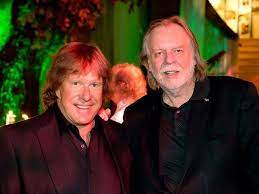 Do you think it was pointless the rivalry among progressive rock fans about who was better keyboard player: you or Keith Emerson ?
Do you think it was pointless the rivalry among progressive rock fans about who was better keyboard player: you or Keith Emerson ?
Keith and I were always thinking it was very funny, because we are so different. I mean, it is like asking who is better: the goalkeeper or the centre-forward? We were completely and utterly different. Keith had much more of a jazz style. I can hear a lot more jazz in the way that he worked and played and I was more of an Eastern European classical nature in the way that I worked and played. We were so different. Keith and I were very-very good friends and we never used to mind these people who wanted to say: “I prefer Keith to Rick” or “I prefer Rick to Keith”. That’s fine as everybody has his choice. It’s just like food: Somebody prefers a chicken to a curry. It doesn’t make one better than the other. As I said, it was something that we found amusing. We had planned to do an album together which we had some great ideas on, but unfortunately Keith with the problems he had with his hands, he was able to play less and less and less as the years went by. So, in the end we had to shelve the idea which was a great shame. We had whole plans to do a tour together. It would have been great fun.
Was it an interesting experience to meet Fidel Castro in Cuba?
It was a fantastic experience! Interestingly enough, I was always told by my late father who died cracky 45 years ago, to experience things for myself. If somebody said: “Oh, this particular person is a nasty person” my father would always say: “Have you met him?” and they would say: “Oh no, but I’ve read about him”. My father would say: “Well, make an opinion when you meet him”. So, I ‘ve read a lot about Fidel Castro and I went down there, I was the first major Western band ever to play there. I went with his permission. I got to meet him and I went to one of his lectures. His politics are completely the opposite to mine, but I understood every thing that he was doing and why he was trying to do it. We sat down with his translator. We talked for quite a long time and it was interesting because it was very obvious the amount of untruths that were being told about things down there and it was a great shame. I mean, they were being cut off by a lot of the Western world with the imports that they needed. They were being blackmailed in many respects and Castro was a strong person and he did not want to be blackmailed. He wanted to do the best he could under circumstances but the Western world didn’t help Cuba, that I think Cuba would have been quite a different place. But history will eventually start telling the truth. I mean, the Bay of Pigs (ed: invasion -1961) was denied for many-many years and then suddenly “Oh!” It was the Western world that lied and not Cuba, but I had a wonderful time down there. I met some wonderful people, I met some incredible musicians. I would love to go back.
Could you imagine Yes albums without Roger Dean’s images?
No. In fact, I think it’s really funny that the albums that tend to be remembered the most by Yes fans, are the ones where Roger did the cover. He has done some covers for me, as well. He is undoubtedly the visual sixth member of Yes. No doubt about him.
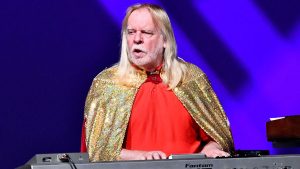 Are you optimistic about the future of progressive rock?
Are you optimistic about the future of progressive rock?
I am really very confident about the future of progressive rock because obviously it would never reach the heights that it reached in the early ‘70s when it was the major music almost, but it is certainly growing all the time. The thing that is encouraging is that there are so many young musicians who are playing progressive rock, all different kinds. That is really encouraging. And its musicians who want to push themselves as hard as they can and that’s fantastic. That’s what prog rock is able to offer: Musicians. It’s a genre of music when people can really try and experiment and push themselves.
Do you remember your 1997 concert in Athens with Mick Taylor (guitar) of the Rolling Stones?
I remember it very-very well (laughs). It was a beautiful venue (ed: Lycabettus Theatre). It was really funny. It was a friend of mine who was managing Mick Taylor at the time and he called me up and said: “Would you like to come to Athens and be part of the band?” He was putting a band together just to do a show. I said: “I would love to. That sounds great fun”. I came over to Athens and we had a rehearsal booked for the day before. We all met in the hotel lobby to go off to rehearsal and Mick came down and said: “Ok, here is the list of the pieces I want to play”. We all uttered: “Ok”. He said: “Do you all know them?” We said: “Yes, we know the pieces”. He said: “Ok, fine. See you tomorrow” and that was the rehearsal. We never played one note (laughs). We went to the venue and I remember I was going with Snowy White (ed: Thin Lizzy, Roger Waters -guitar). I asked him: “Do you know the keys?” Snowy played with Mick quite a lot, so we got some of the keys together and worked on how we were going to do. We literally just played live and it was actually great fun, because we just really all enjoyed ourselves.
A huge “THANK YOU” to Mr. Rick Wakeman for his time. I should also thank Billy James for his valuable help.
Official Rick Wakeman website: https://www.rwcc.com/
Official Rick Wakeman Facebook page: https://www.facebook.com/RickWakemanMusic
Official Rick Wakeman Twitter page: https://twitter.com/grumpyoldrick

